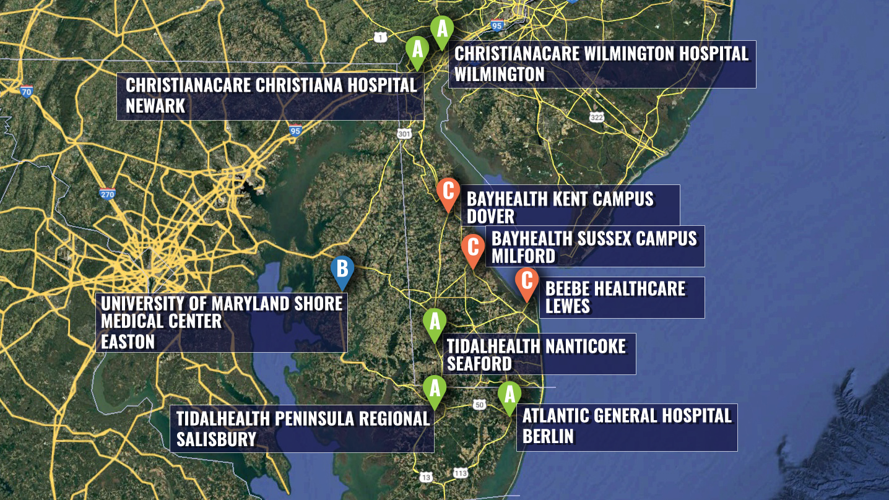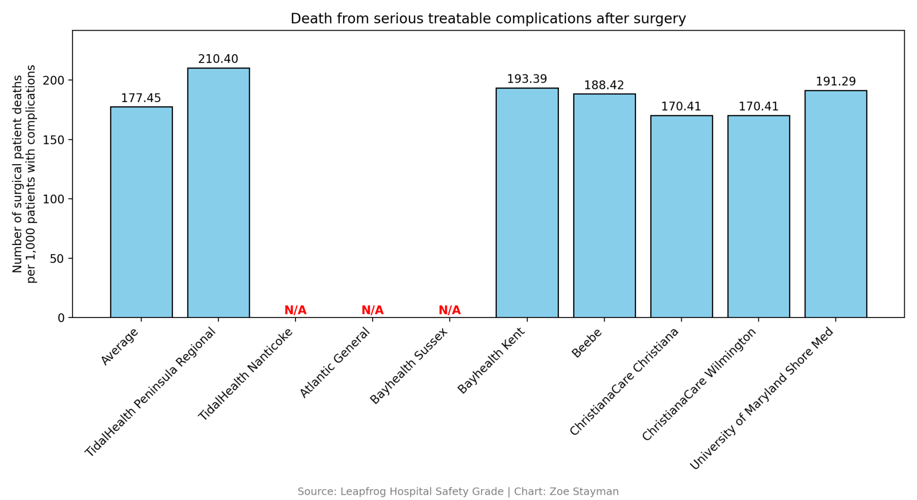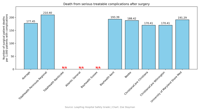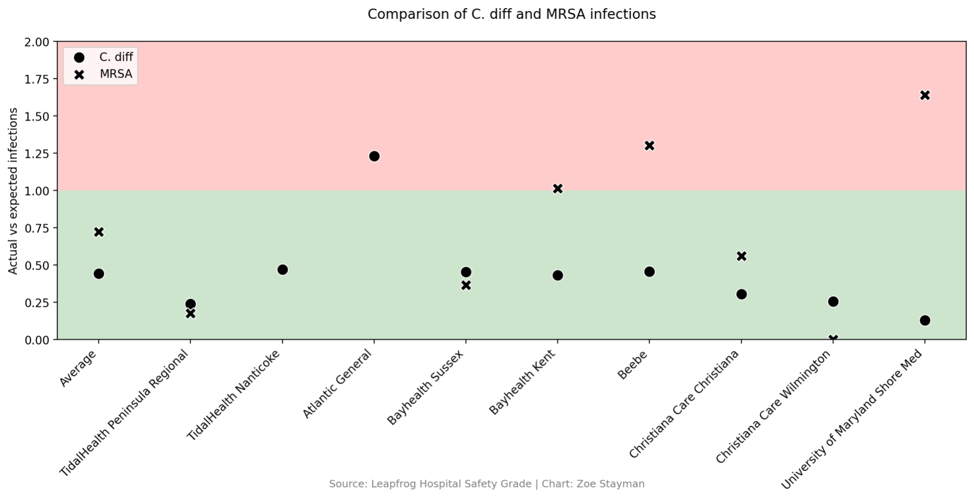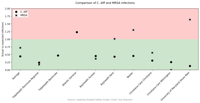DELMARVA - Whether you're heading in for surgery or rushing a family member to the emergency room, the hospital you choose can affect more than your insurance bill; it can shape how safely you leave. Twice a year, a national nonprofit tries to answer a crucial question: How safe are the hospitals you rely on?
The spring 2025 Leapfrog Hospital Safety Grade report shows where Delmarva's hospitals excel at preventing harm and where room remains to improve. Behind each letter, however, is a deeper story about surgical complications, infection risks, communication and how growing communities are shaping the quality of care.
Five Delmarva hospitals received A's, one received a B and three received C's when it comes to safety, according to Leapfrog's spring 2025 report.
This is an improvement from fall 2023, when no Delaware hospital received an A. At that time, TidalHealth Peninsula Regional in Salisbury was the only hospital on Delmarva with an A.
Leapfrog's twice-yearly scorecard aggregates more than 30 measures of infections, safety, preventative practices, surgical outcomes, staffing and communication to rate hospitals across the country from A to F.
Scroll to the end of this article for a hospital-by-hospital breakdown of scores and what they mean for patients.
Five of the nine hospitals that serve Delaware and the lower Eastern Shore of Maryland— TidalHealth Peninsula Regional, TidalHealth Nanticoke, Atlantic General and ChristianaCare's Christiana and Wilmington hospitals— earned A's in the spring 2025 Leapfrog Hospital Safety Grade. The University of Maryland Shore Medical Center at Easton received a B. Bayhealth's Kent and Sussex campuses, along with Beebe, received C's.

Out of nine hospitals on Delmarva, five received A's, one received a B and three received C's when it comes to safety, according to Leapfrog's spring 2025 report.
HOW SCORES ARE DETERMINED
The Leapfrog Group, a Washington-based national nonprofit that collects, analyzes and publishes data on healthcare safety and quality, conducts programs like the safety grade, which evaluates nearly 3,000 hospitals nationwide on how well they keep patients safe.
These safety grades, issued every spring and fall, are determined by using performance measures from the Centers for Medicare and Medicaid Services, surveys submitted by hospitals and supplemental data sources. Measures are then weighted based on evidence, opportunity for improvement and impact. Hospitals missing too many measures do not receive a safety grade.
The spring 2025 grades reflect data from between 2021 and 2024, depending on the category. Because of Leapfrog's scoring methodology, Hospitals missing too much data aren't graded. For those that are, each measure is weighted based on its impact on patient outcomes.
The chart below is comprised of data for different measures that are compiled by the Leapfrog Group to determine a hospital's letter grade.
HOW LOCAL HOSPITALS COMPARE NATIONALLY
Despite the challenges of serving largely rural areas and growing coastal populations, Delmarva's hospitals performed well on several key national safety standards.
For instance, these nine facilities have physicians with advanced training in intensive or critical care working in their ICUs, which even some larger urban hospitals did not. Six local hospitals met Leapfrog's standard for electronic prescribing, a practice that helps prevent errors. Three others saw considerable achievement in this area, according to the Leapfrog data. All of Delmarva's hospitals reported zero cases of "never events" like air embolisms, as well.
These wins suggest that, despite smaller labor pools, core systems to prevent many potentially catastrophic errors have been implemented. Yet, the data shows these same hospitals can sometimes stumble on other critical metrics that hinge on day-to-day bedside care.
Hospitals serving southern Delaware's explosive growth like Beebe, Bayhealth Sussex and Bayhealth Kent reported bed sore rates worse than the U.S. average. Bayhealth Kent ranked among the nation's poorest performers in patient fall fractures and collapsed lungs after procedures. Even the area's only straight-A hospital, TidalHealth Peninsula Regional, reported a surgical complication death rate closer to the nation's poorest performers than to its best.
Challenges aside, there are some bright spots. For the first time, Leapfrog is recognizing straight-A hospitals, or those that have earned an A for five or more consecutive reporting periods. TidalHealth Peninsula Regional is the only hospital on Delmarva to achieve this status, joining just 12 percent of eligible hospitals nationwide.
Mid-Atlantic neighbor New Jersey is one of the top five states in the country with the highest share of straight-A hospitals by Leapfrog's standards, with 27 percent of its eligible facilities receiving this status. It is also one of six states with the highest percentage of A grades this spring. Though an influx of out-of-state license plates shows that New Jerseyans love moving to Delaware, it may not be for healthcare. The first state is, by contrast, one of 12 states (plus Washington, D.C.) with no straight-A hospitals in Leapfrog's grading system.
When looked at together, the data paint a nuanced picture; Delmarva's hospitals can meet or exceed high-standard structural requirements, but patient care issues can still appear that technology and checklists alone can't yet erase.
WHAT THE NUMBERS SAY THIS SPRING
Among all of the measures Leapfrog evaluates, one potential regional red flag is deaths from serious, treatable complications after surgery. Four Delmarva hospitals scored worse than the national average in this category, according to the Leapfrog safety grade data. Two others were slightly above average. The remaining three did not receive a score in this category, meaning they did not have enough data to report for this measure, not that they withheld information.
TidalHealth Peninsula Regional had the lowest available local score for this measure despite its straight-A status. ChristianaCare's Christiana and Wilmington hospitals reported the best numbers for Delmarva in this spring's report and were the only ones on the peninsula slightly above the national average.

After surgery, patients can sometimes develop serious complications while still in the hospital, such as pneumonia, have a heart attack or lose function in their kidneys or liver. These numbers represent the number of surgical patients who died for every 1,000 people who had a serious treatable complication after surgery, according to Leapfrog.
When it comes to infections, most hospitals in Delaware and on the Eastern Shore of Maryland performed better than expected when it came to infections like C. diff and MRSA, two potentially dangerous bacteria commonly spread in healthcare settings.
C. diff can cause diarrhea, abdominal pain and fever, often after antibiotic use. The University of Maryland Shore Medical Center at Easton scored well when it came to C. diff, while it performed worse than expected for MRSA, which is a type of staph infection that resists many antibiotics and can be spread through contaminated equipment or unwashed hands. Preventing these infections comes down to hygiene, from handwashing to proper equipment sterilization, and the data suggests most local facilities are doing well.

The plotted numbers represent comparisons made during Leapfrog's scoring process when it comes to infections. The comparison looks at the number of infections that actually happened at a hospital compared to the number expected for it, given the number of patients cared for on a daily basis and how widespread these bacteria are in the local community. A number lower than one means fewer infections occurred than were expected, while a number greater than one means more infections than expected.
HOSPITAL-BY-HOSPITAL
Letter grades can offer a quick snapshot, but they don't tell the full story. Each grade is a weighted blend of more than 30 performance measures. Some measure scores are drawn from fresh data, while others are from years ago; some reflect hospital-reported surveys, others come from the Centers for Medicare and Medicaid Services.
This means a hospital can excel in one area, like infection control, but fall short in another, like preventing surgical complications. The interactive breakdown below highlights wins and potential warnings at each hospital. Tap through the tabs to explore details from each score card, including trends over time and thoughts from hospital leadership.
TidalHealth – A
TidalHealth, including both the Peninsula Regional facility in Salisbury and the Nanticoke facility in Seaford, received A's through the Leapfrog Hospital Safety Grade this spring. The Nanticoke facility maintained the A rating it achieved in the fall, which was preceded by a B in spring 2024 and C's in 2023 and 2022.
"Achieving an A grade for a second consecutive period reflects the deep commitment of our entire team in Seaford to uphold the highest standards in clinical excellence, safety practices and compassionate care," said Penny Short, president of TidalHealth Nanticoke. "We're proud to serve our community with the safest and most reliable healthcare in downstate Delaware."
Peninsula Regional has maintained A's straight back through 2023, with B's in 2022. That being said, even as the only straight A hospital on Delmarva, it had the worst score for the measure which looked at patient death from serious treatable complications when compared to others locally. Complications in this measure include pneumonia, heart attack or losing function in an organ. Leapfrog says these types of complications are serious but can be treated by a good hospital team. It is worth noting, as mentioned above, that three of the nine Delmarva hospitals included in this article did not report scores for this measure, and of those that did, they remained below or around average when compared nationally.
TidalHealth Peninsula Regional and TidalHealth Nanticoke scored below average when it came to patient falls; however, when looking directly at the data and not just comparisons to other hospitals, the picture may change. In this case, below-average means that, at TidalHealth Nanticoke, which received the worst score between the two, less than one person out of 1,000 patients who were eventually discharged experienced a fall or similar trauma, according to Leapfrog.
Nanticoke's communication with doctors, nurses and staff received high marks from patients. Scores for this measure represent a zero-to-100 scale based on patients' perspectives of how effectively doctors and nurses explained things and listened to them. Nanticoke also scored well for the speed of response of hospital staff when patients request help for pain, new symptoms or cannot reach the bathroom alone. Nanticoke received the highest scores for nurse communication and hospital staff response on the Peninsula, with a 93 and 85, respectively. In these three staff-patient communication categories, Nanticoke was joined by Atlantic General in receiving above-average scores; in fact, Atlantic General had the highest peninsula score for doctor communication with a 93.
As an overall hospital, Atlantic General also received an A alongside the two TidalHealth facilities, a good sign given the new partnership between these healthcare systems that began May 1, which brings Atlantic General under the TidalHealth umbrella.
"Safety is foremost for all healthcare providers. Our team at Atlantic General Hospital worked extremely hard over the past year to improve to an A, which is an outstanding achievement in support of their patient safety mission," said Steve Leonard, president and CEO of TidalHealth.
In addition to its doctor communication score, Atlantic General also had the best score on Delmarva when it came to communication about discharge, but the worst score for C. diff infections. According to the Leapfrog safety grade results, Atlantic General received a 1.23 for C. diff infection. This number represents a comparison of the number of infections that actually happened to the number expected for this hospital based on its number of patients and how widespread C. diff is in the local community. A number higher than one means more infections than expected, according to Leapfrog.
Bayhealth – C
Bayhealth's Kent and Sussex facilities have had different trends in recent years. While the Kent campus has received a C for the past six Leapfrog Hospital Safety Grades dating back through spring 2022, the Sussex campus has shown a downward trend. In 2022, the Sussex campus received an A in both the spring and fall. In 2023 and spring of 2024, the hospital received B's. Starting in the fall of 2024, Bayhealth Hospital's Sussex campus received a C, which it got again this spring.
"At Bayhealth, we are deeply committed to delivering exceptional care and the best possible experience for all the patients we serve across our facilities," Executive Vice President and Chief Operating Officer Kyle Benoit tells WBOC. "We are disappointed that our recent Leapfrog Hospital Safety Grades of C this year do not fully reflect the outstanding dedication and high-quality care our clinicians provide daily."
Looking at specific measures, the Sussex Bayhealth campus had the worst score of Delmarva's hospitals for surgical site infection after colon surgery. This score, a 2.124, is below the national average and represents the number of infections after colon surgery that actually happened compared to the expected number for this hospital. Numbers above one mean more infections occurred than expected.
At the Kent campus in Dover, scores were not good for patient falls. In particular, this facility's Leapfrog score was equal to the worst score received by all hospitals across the nation for collapsed lungs, at 0.65 for every 1,000 people, and falls that cause broken hips, at 0.56 per 1,000 people.
When it comes to sepsis, Bayhealth Kent was also a bit below the national average and the lowest scoring on Delmarva. According to the spring 2025 Leapfrog safety grade, 5.63 surgical patients per 1,000 experience sepsis across the country. At Bayhealth, that number is 6.69 patients per 1,000, followed next by Bayhealth Sussex at 5.29, which is actually slightly better than the national average.
Despite these reports from post-surgery care, the Bayhealth Kent campus received above-average scores when compared to hospitals across the nation for not having problems with surgery, including surgical wounds splitting open, blood leakage, kidney injuries and accidental cuts and tears. Both Bayhealth facilities also received top marks for effective leadership structures that increase awareness of patient safety issues.
"These scores are not where we aim to be, and we have multiple teams actively developing detailed action plans to enhance our quality metrics and address areas needing improvement," Benoit said.
Beebe – C
Beebe has generally remained steady, receiving C's in five out of the last six Leapfrog Hospital Safety Grade reports, including this spring. Beebe received a D in spring 2024. Beebe's last A was given in the spring of 2020.
When asked for comment, Beebe Healthcare President and CEO Dr. David Tam told WBOC that, while Beebe recognizes the value of independent surveys and takes every opportunity for improvement seriously, the organization does not feel the recent Leapfrog score reflects the quality of care that Beebe clinicians and staff members provide to patients and the community each day.
Tam also pointed out that this spring's scores rely on historical data, not the most recent.
"Beebe consistently meets or exceeds several other quality and safety standards, as is reflected in our ranking as the number two hospital in Delaware, according to U.S. News and World Report," Tam said.
Across Delmarva, Beebe scored worst for kidney injuries after surgery and harmful events. Beebe received a 2.12 in the spring 2025 Leapfrog safety score, a number that represents the estimated number of times patients experienced kidney failure after major surgery for every 1,000 people who had surgery. It's worth noting that patients who are older or have other pre-existing health problems are at a greater risk of experiencing kidney failure, and Beebe is in the heart of coastal Sussex County, which has seen an influx of retirees in recent years.
Additionally, Beebe scored by far the worst when compared to other local hospitals when it came to bed sores. The hospital's score of 7.16 patients with dangerous bed sores for every 1,000 people discharged was closer to the national worst of 7.5 than it was to the next closest Delmarva facility, which was the Bayhealth Sussex campus with a score of 1.83. Bed sores are wounds on the skin that form when a patient remains in the same position for too long without being moved. Advanced bed sores can become large and deep, potentially reaching muscle or bone and leading to pain or serious infection.
On a positive note, Beebe reported improvements in areas such as handwashing, receiving a 100 this spring compared to a 40 in the fall of 2023, and beating the national average number of patients that experienced a sepsis infection, which was also below average a year-and-a-half ago.
Additionally, Beebe received a positive score for central line-associated blood infections. Scores in this category represent a comparison of the number of blood infections that actually happened at Beebe compared to the number expected there based on the number of central lines used and other factors like facility type and size. According to Leapfrog, Beebe had fewer infections that would have been expected.
A Beebe spokesperson shared with WBOC that the hospital celebrated several quality and safety achievements in 2024 and continued success into this year, including zero central line-associated bloodstream infections and four years in a row without one of these types of infections in the ICU. The hospital also achieved more than a 50 percent reduction in patient falls through its fall prevention task force, according to Beebe, which evaluates the causes of patient falls and identifies opportunities to improve in the future.
Beebe also received positive Leapfrog scores from patients when it came to communicating information about home care and the help they would need during recovery, including written information about symptoms or issues to watch for during recovery.
"Quality and safety efforts are never complete for any health system. Day after day at Beebe, we evaluate and apply evidence-based improvement methods to identify, define, measure, analyze and improve processes, systems and structures to achieve the highest standards for patient safety and secure the best patient outcomes," Tam said.
ChristianaCare – A
ChristianaCare's Christiana and Wilmington hospitals have been on the upswing in recent years when looking at their Leapfrog Hospital Safety Grade reports. The Christiana hospital received an A this spring, its highest score received in recent years. ChristianaCare's Christiana hospital received B's in 2024 and C's in 2023. This spring, the Wilmington hospital maintained its A rating from the fall, which was an improvement from a B in spring 2024 and a C's in 2023.
The Wilmington hospital's MRSA infection score was the best on the peninsula, determined by Leapfrog as being better than expected for a facility like it. In fact, this hospital was the only one on Delmarva that reported above-average scores when compared nationally in all measures related to infection, including for C. diff infections, infections in the blood or urinary tract, surgical site infections after colon surgery and sepsis after surgery.
Both the Wilmington and Christiana facilities are slightly above average when it comes to deaths from serious treatable complications after surgery and had the best scores on Delmarva with both reporting 170.41 surgical patient deaths for every 1,000 people who had a serious treatable complication after surgery, down from the 177.45 national average.
Both ChristianaCare hospitals also had above average scores in a variety of safety categories like avoiding falls, collapsed lungs, dangerous blood clots and potentially harmful events after a surgery, procedure or childbirth.
UM Shore Medical Center – B
The Shore Medical Center in Easton has remained generally consistent over the past three years in the Leapfrog Hospital Safety Grade. It received a B this spring, the same score received in 2024. Before that, it received A's in 2023 and 2022.
This spring, the University of Maryland Shore Medical Center did worse than a hospital like it was expected to when it comes to MRSA infections, receiving a below-average score nationally and the worst score on Delmarva.
On the other hand, it had the best Delmarva score of 5.3 per 1,000 surgical patients who experienced serious breathing problems. This score was well below the national average of 10.53, as well.

